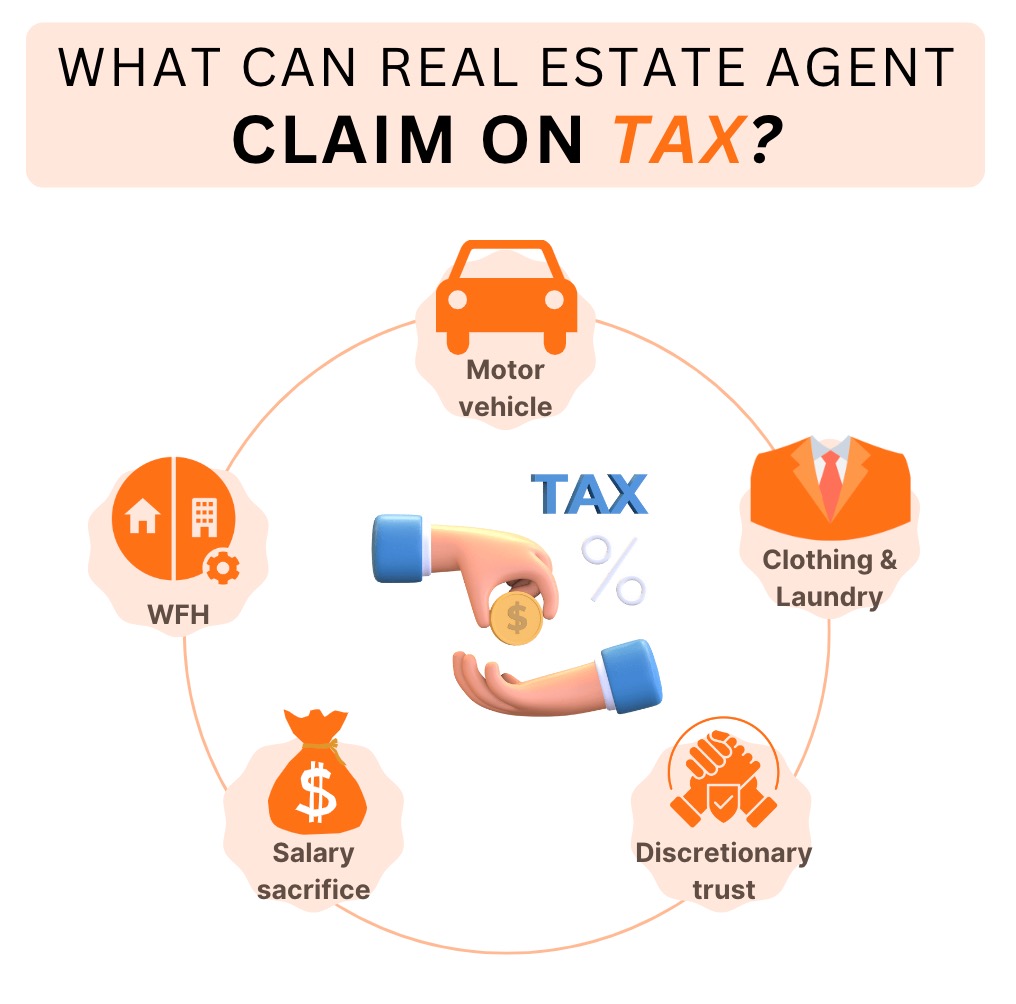It’s probably fair to say that tax time is one of our least favourite seasons of the year. After all, nobody enjoys handing over their hard-earned cash to the government.
But taxes are not a choice. They’re a legal obligation. So, when it comes to calculating what you owe, it’s worthwhile thinking about the question of what real estate agents can claim on tax. Through careful planning, you should be able to reduce the amount you have to pay to the Australian Tax Office (ATO).
Calculate your income
How do you work out what real estate agents can claim on tax? Well, you start by tallying up your income for the year. This should include salary, wages and payments from all sources, including:
- online bank account deposits
- cash-in-hand payments
- government support payments
- parental leave payments
- insurance income protection, sickness or accident insurance policies
- workers compensation schemes
- some types of foreign income
- income from shares, investments or other part-time work.
It’s important to report all applicable sources of income in order to remain in compliance with Australian tax law.
After you’ve calculated your income, it’s time to consider what real estate agents can claim on tax.
Tax-free threshold
We’ll begin with something that’s a welcome break – your tax-free threshold. The threshold is the amount you can earn without paying a single cent in Commonwealth income tax to the ATO.
In other words, for the current financial year, your first $21,855 of income is exempt from tax. You only start owing tax for every dollar you earn after $21,855.
Nice, right?
Input your deductions
Now it’s time to look at the types of expenses you can deduct against your tax bill. As a general rule, what real estate agents can claim on tax are expenditures directly related to the act of earning income.
Always check that you’re not claiming for expenses you’ve already been reimbursed for. This type of double dipping can get you into trouble, even if it’s an oversight. To avoid this mistake, always keep detailed records of every expense you intend to claim, as well as those you’ve been reimbursed for. Separate, of course!
Motor vehicles
What real estate agents can claim on tax for vehicle expenses includes:
- costs incurred while driving directly from one job site to another on a single day
- costs incurred while driving to and from an alternate workplace for the same employer on the same day, such as travel from the office to a client’s home.
In most instances, you won’t be able to claim commuting costs from home to your office, unless you have no fixed place of work and travel from site to site throughout the day.
You can use either the cents per kilometre or the logbook method to calculate your tax deductions for car expenses.
The logbook method requires keeping written travel records that will document the percentage of your car use that is work-related. This method allows you to make an additional claim for the depreciation in value of your motor vehicle for the business portion of its use.
The cents per kilometre method requires you to document the distances you travelled by car for your work-related purposes. The deduction current rate is 72 cents per kilometre and this includes compensation for the depreciation in value of your vehicle. This means that under the cents-per-kilometre method you cannot make a separate depreciation claim.
Unfortunately, using either of these methods means you will not be able to claim any additional car-related tax deductions for repair, petrol or insurance costs.
To find out more about small business motor vehicle expenses see the ATO website.
Clothing and laundry
Let’s now look at the rules about what real estate agents can claim on tax for clothing and laundry expenses.
In general, you’re only entitled to claim a deduction on tax for the cost of clothing if you’re required to wear a certain type of clothing on the job, such as a uniform. This clothing must be distinctive and your workplace must have a dress code that is enforced in practice.
You may also be able to claim the cost of non-compulsory uniforms that are registered with the Commonwealth Ausindustry agency. Check with your employer for further information.
Laundry and repair costs for compulsory workplace clothing may also be valid items for what real estate agents can claim on tax.
But be aware that tax deductions are not applicable to the cost of buying or repairing normal business attire and casual clothing. So, unfortunately, you can’t claim for any designer or high brand clothes that help build your real estate image on your income tax return.
Working from home
Even before COVID-19, work-from-home arrangements were becoming more prevalent. And now, in the wake of the pandemic, they’ve become the norm in professional workplaces, with employers offering hybrid schemes that involve a mix of office days and days working from home.
Let’s see how work-from-home arrangements apply to what real estate agents can claim on tax.
As with other expenses that are eligible for deduction from your tax bill, claims for work-from-home expenses must be directly related to your employment. To justify your claim, you must use one of the following methods defined by the ATO to calculate your work-from-home deduction.
Fixed-rate work-from-home deductions
The fixed-rate method allows you to claim a deduction of 52 cents for every hour you have worked from home. To support your fixed-rate deduction claim you must:
- record the number of hours you worked at home
- keep receipts of all expenditures on depreciating assets or equipment you use for work while at home
- record the number of hours you worked from home over the entire tax year.
Read more about the fixed-rate method on the ATO website.
Actual cost work-from-home deductions
The actual cost method calculates the dollar-for-dollar expenses that enable you to work from home. To support your actual cost claim you must:
- incur added expenses that arise from your work from home
- keep written records and receipts that record the amount you spent on costs arising from your work from home
- record the amounts spent on depreciating assets used while working from home.
For more information about the actual cost method go to the ATO website.
Shortcut work-from-home deductions
This method was a temporary COVID-related method of calculating deductions that expired on 1 July 2022. In other words, it is valid for use on your 2021–22 tax return.
For more information about the shortcut method go to the ATO website.
Expenditures that may not be used to calculate work-from-home deductions include:
- beverages and other household items (even if your employer provides them at the office)
- work tools (computers, tablets or mobile phones) provided by your employer, or for which you received reimbursement from your employer.
Business entertainment
Be aware that in most cases, the ATO does not recognise business entertainment costs as a legitimate tax-deductible expense. Therefore, if you take a client out to lunch or dinner, you won’t be able to claim the bill as a deduction on your tax.
Discretionary trusts
A discretionary trust is a financial framework in which a trustee holds the assets of the trust for the benefit of the beneficiaries. These are widely used in business and for property investments.
A discretionary trust often serves as an effective tool to maximise what real estate agents can claim on tax. They are often used by real estate agents who own their agencies. Also known as family trusts, they’re ‘discretionary’ in the sense that any disbursement of income or capital gains to beneficiaries is made at the discretion of the trustee, and the beneficiaries are members of the same family.
For more information on the tax treatment of discretionary trusts, go to the ATO website.
Salary sacrifice (packaging)
Salary sacrifice arrangements allow employees to forego part of their pre-tax salary in return for benefits of similar value provides by their employer. This is offered by the employer as an option the employee may choose.
By entering into a salary sacrifice arrangement, employees receive a benefit from their employer while reducing their taxable income, and hence the amount they owe to the ATO.
One of the most common forms of salary sacrifice relates to superannuation contributions. Employees top up contributions to their super account and reduce their tax obligation at the same time. And from the taxation perspective, those extra payments are defined as employer contributions. This means salary sacrifice to superannuation can be a win-win for employees – more money for their retirement tomorrow and a lower tax bill today.
The ATO will classify some salary sacrifice arrangements as fringe benefits that are subject to taxation. Items such as school fees and share purchases are usually subject to fringe benefits tax (FBT).
But work-related items acquired through salary sacrifice arrangements may be exempt from FBT, including computers and computer software, mobile phone and tablets, protective clothing, briefcases and trade tools.















